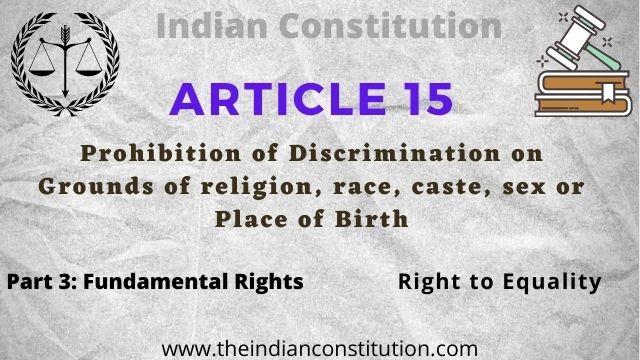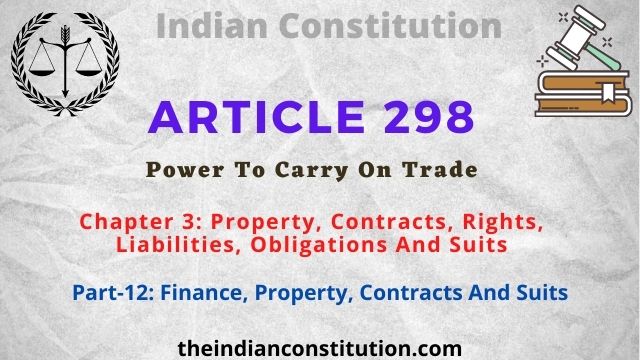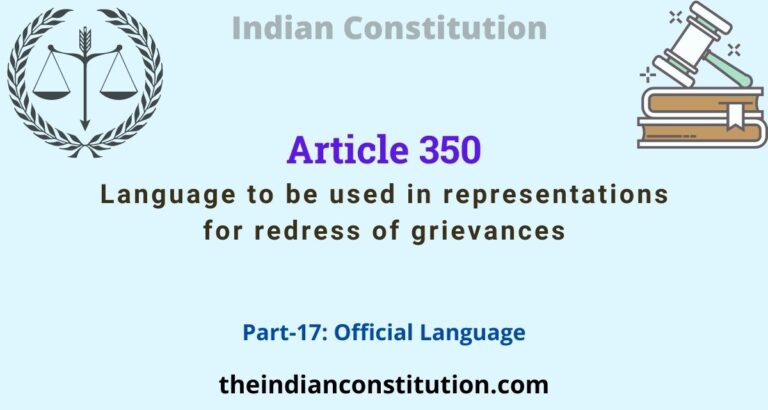Article 15 Prohibition of Discrimination In The Indian Constitution
In Part 3 of the Indian Constitution Article 14 to Article 18 has been classified into Right To Equality. In which Article 15 prohibits the state from distinguishing citizens on certain grounds.
Article 15: Prohibition of discrimination on grounds of religion, race, caste, sex or place of birth
15(1): The State shall not discriminate against any citizen on grounds only of religion, race, caste, sex, place of birth or any of them.
15(2): No citizen shall, on grounds only of religion, race, caste, sex, place of birth or any of them, be subject to any disability, liability, restriction or condition with regard to—
15(2)(a): access to shops, public restaurants, hotels and places of public entertainment; or
15(2)(b): the use of wells, tanks, bathing ghats, roads and places of public resort maintained wholly or partly out of State funds or dedicated to the use of the general public.
15(3): Nothing in this article shall prevent the State from making any special provision for women and children.
15(4): Nothing in this article or in clause (2) of article 29 shall prevent the State from making any special provision for the advancement of any socially and educationally backward classes of citizens or for the Scheduled Castes and the Scheduled Tribes.[First Amendment Act; 18-06-1951]
15(5): Nothing in this article or in sub-clause(g) of clause(l) of article 19 shall prevent the State from making any special provision, by law, for the advancement of any socially and educationally backward classes of citizens or for the Scheduled Castes or the Scheduled Tribes in so far as such special provisions relate to their admission to educational institutions including private educational institutions, whether aided or unaided by the State, other than the minority educational institutions referred to in clause(l) of Article 30.[93th Amendment act,2005]
15(6): Nothing in this article or sub-clause(g) of clause(l) of article 19 or clause(2) of article 29 shall prevent the State from making, [103rd Amendment act 2019]
15(6)(a): any special provision for the advancement of any economically weaker sections of citizens other than the classes mentioned in clauses (4) and (5); and
15(6)(b): any special provision for the advancement of any economically weaker sections of citizens other than the classes mentioned in clauses (4) and (5) in so far as such special provisions relate to their admission to educational institutions including private educational institutions, whether aided or unaided by the State, other than the minority educational institutions referred to in clause (1) of article 30, which in the case of reservation would be in addition to the existing reservations and subject to a maximum of ten percent. of the total seats in each category.
Explanation.— For the purposes of this article and article 16, “economically weaker sections” shall be such as may be notified by the State from time to time on the basis of family income and other indicators of economic disadvantage.
-Text in Constitution
Explanation Of Article 15
By reading text of this article in constitution, it seems that there is a very wide subject matter.
Article 15(1):
This section protects against state proceedings. The article says that in any political, economic, civil, or other work done by the state, no citizen shall be discriminated against only on the basis of religion, race, caste, sex or place of birth or any of them.
It simply means that the state cannot give more importance to one religion other religion, both have to be the same. This article gives equal rights to minority communities like other communities.
Notice here the word ‘only‘ is written, meaning that in addition to this the state can discriminate on any subject.
In such cases, we cannot go to court and ask for our rights. For example, discrimination on the basis of language, residence, physical or intellectual ability.
Example(1): A person born in Gujarat will get a ration card of Gujarat easily, whereas laborers who have come to work here from Bihar.
They have been a resident of Gujarat for many years yet will not get a ration card. (Now the government is bringing One Nation One Ration card for solution)
Example(2): As women are deemed more suitable for nurses and less suitable for working in heavy industries, it will not be considered unconstitutional.
Article 15(2):
No public place will be discriminated against on the basis of religion, race, caste, sex, place of birth.
But this clause stipulates that the site must be run in whole or in part by government funds, meaning that these rights do not apply to private institutions.
Which subjects can be discriminated against?
Violations of the policy of a place, caused by a Infectious disease like a corona, physical (do not allow the child to go near the pond) or intellectual incapacity, etc. Positive topics can be discriminated against.
Article 15(3):
Providing reservation for women or children will not be considered inequality. Such as a seat reserved for a woman in a government bus or rail.
Article 15(4):
If the state only gives reservation to socially and educationally backward community, then it will not be a loss of the right to equality of other community. Meaning that the people of General Category cannot go to court and demand the right of equality against reservation.
In order to compensate for discrimination against some community in the past, it has made a provision of Positive or Protective Discrimination.
After adding it with the first constitutional amendment, the reservation was given to the OBC, ST, SC community.
Article 15(5):
It was added in 2005 by the 93rd Constitutional Amendment. Article 15 only protected against discrimination against a government or government-funded institution, to remove this deficiency, add a provision for SC, ST reserved seats in the private educational institutions.
The principle of reservation derives from Article 15, and the principle of Creamy Layer also.





thanks for the information, plzz include important case laws for help…
Thank You for the suggestion.
I am working on cases and will add them soon.
There is a saying “Law lies in the womb of law”. so is here. After reading the
matter, I find nothing but empty handed.
It’s very helpful for me in preparing note ????????